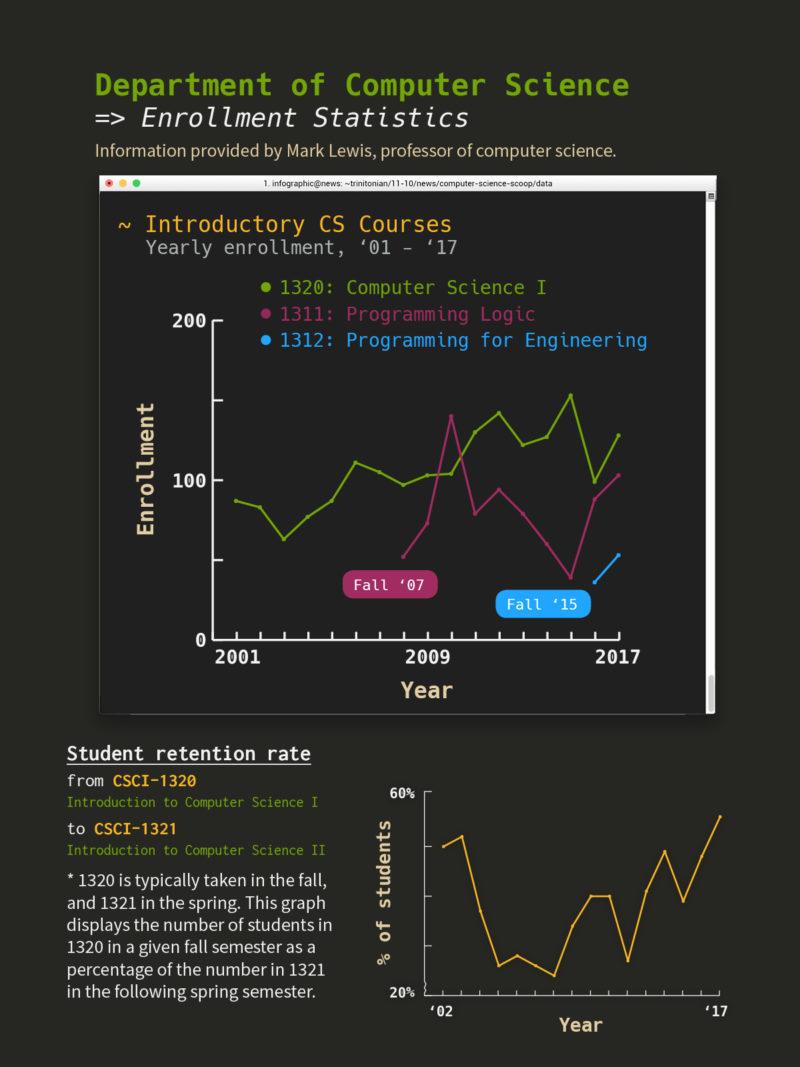Just five days before registration for the spring semester, the schedule for computer science courses was finalized. Prior to the near last-minute update, a series of emails to majors and faculty members announced the necessity to restructure the course schedule, leaving students on edge as enrollment quickly approached.
Paul Myers, chair of the computer science department, cites increased interest in computer science as a reason for the scheduling problems.
“Our enrollments have typically been like a sine wave. Right now, we are very much at a peak, and I think this peak is higher than previous peaks,” Myers said. “We have a colloquium that usually has around 40 or 50 students, but now there seems to be about 80.”
Along with adapting the course schedule, the department also announced that Myers will go on leave in spring, and associate professor Yu Zhang will take up the position of acting chair during his absence. Myers commented on his leave as long overdue.
“The way academia works is that faculty are encouraged to take a leave every five or six years. It’s a chance to rejuvenate “” it’s a chance to get research going without being distracted by teaching and other things. In that context, I’ve been here 32 years, and this is my first leave, so it’s way overdue,” Myers said.
However, Myers’ leave has not come at the best time, as the department has seen a large increase in enrollment. Myers explained his decision to go one leave now, saying that the classes he teaches in spring are all elective courses.
“I don’t teach any required classes in the spring; whereas in the fall, I do. So, it would be easier for me to not be here in the spring as opposed to the fall in terms our schedule,” Myers said. “That would’ve been fine, except there has been a surge in enrollment “” both interested minors and majors “” and enrollments from other departments where our courses are required.”
Sam Ortiz, junior computer science major and secretary of Trinity Women in Computing (TUWIC) also commented on the increased enrollment.
“I’ve noticed a big increase in freshmen and sophomore kids in general. I’ve also noticed that our TUWIC meetings have been a lot more full of girls, which is really good,” Ortiz said.
As for the delayed schedule, Ortiz did not think it was that big of an issue.
“The scheduling delay was more of a drama thing because we were all just waiting to see what classes were going to be available,” Ortiz said.
Emily Herbert, senior computer science major and president of TUWIC, also noted that increased enrollment seems to hit those in the middle of the major the hardest.
“A lot of the competition for classes hits the mid-tier students, like sophomores and juniors, because they always want to make sure that everyone that wants to take the intro classes are able to, and then there’s a lot of overflow in the electives and mid-tier classes,” Herbert said.
To adjust to the predicted size of enrollment this coming semester, the department restructured the schedule to offer more upper-division electives, which in turn altered the times that lower division classes will be offered due to instructor and space availability. The department will also receive some help next semester from an additional faculty member, but Myers is hesitant to hire another full-time professor.
“The only way to handle this is additional faculty. I’ve been really reluctant to do that, as I don’t regard myself as an empire builder,” Myers said. “Since we are aware of this sine wave phenomenon, it’s very stressful on us right now, but if it tails off again, then we are good at our current staffing. We can sustain one or two semesters at this peak, but we can’t sustain it if it persists. The normal way that academic departments deal with increased need is to ask for more faculty, so it’s quite possible that we’ll be doing that.”
Myers also seemed to think expansion is in the department’s future.
“I’ve been chair for almost 10 years, and we have never had any faculty member on leave, so we can maintain our course load at the cost of none of our faculty going to do intensive research, which is what the leaves are mostly for,” Myers said. “I think the administration is becoming aware of our department’s staffing problem, not just covering our courses, but giving faculty the freedom to expand their research and their interests.”
Herbert pointed out that the department is not only limited by number of faculty but by number of classrooms, too.
“I definitely think that the CS department would benefit from an additional faculty member, but a big obstacle is the actual lab space. There are three labs on campus where CS classes can be taught, so if we had more spaces, then classes could be taught in more than just those three labs,” Herbert said. “So it’s a combination of more applicable and accessible technology across campus, but also I could see how an additional faculty member could help alleviate the workload of senior professors teaching lower-level classes.”
Ortiz agreed that the physical size of the department hinders studying.
“There are only so many places to study as a comp sci major, and those spaces are typically smaller due to the history of how many students have been in the major, so it’s become overcrowded at times, and that seems overwhelming. I’m at a point where I can do my comp sci work from home, but that’s not the case for everyone. Some people need to do work in the labs, and the labs can get really loud,” Ortiz said.
More information about the computer science department can be found at cs.trinity.edu/old-index.cgi.







